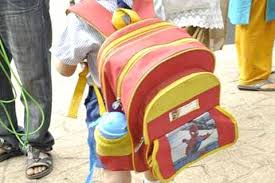Four five-year-old Ali going to school was a pain. Literally. He would come back home complaining of pain in his back and ankles. When his parents took him to an orthopaedic, it was found that the cause of Ali’s pain was the school bag he was carrying.
Little Ali was carrying nearly 9 kg of text books and notebooks.
Doctors say that a child should carry less than 10 per cent of her weight on her shoulders.
Ali is not only student in Kashmir who is suffering. A recent survey by Government Medical College (GMC), Srinagar has revealed that children from schools across Kashmir were carrying school bags heavier than the recommended weight.
The survey by the Department of Social and Preventive Medicine, GMC, had revealed that in schools in Kashmir, 83.7 per cent children carried bags heavier than the recommended 10 per cent of their body weight.
Though technology is playing a large part in modern education, little has changed in Kashmir. Children have to lug a bag full of books to school.
Navid, a Class 5 student says: “I have to carry all my text books and notebooks. If I don’t then my teachers punish me.”
Worse is Navid comes from a poor family and can’t afford to travel in a school van. Walking to school 2 km away with a bag full of books is taking a toll, both physically and mentally.
Children suffer from fatigue, chronic headaches, muscle strain, neck and shoulder pain because of carrying heavy weights, according to Dr Aijaz Ashai, a physiotherapist.
Prolonged carrying heavy weights may lead to distortion of the spine’s curve and compression. Because of this children are stunted.
“There are a number of children who suffer from irreversible back deformities such as kyphosis [hunchback] or scoliosis [spine bent sideways] due to heavy bags,” says Dr Nisar ul Hassan, president, Doctors Association Kashmir.
In 2016, Badrud Duja, a law student, filed a public interest litigation (PIL) seeking a comprehensive policy to reduce the burden of heavy bags on students.
On the instructions of the Jammu and Kashmir High Court, the government formed a committee to look into the matter.
In December 2017, the committee submitted its report to the government with several recommendations that aimed to lighten the load of school bags of students,
However, the authorities have failed to implement the recommendations made by the committee.
A majority of schools in Kashmir don’t have the facility to store books in the schools, says Samina Yousuf Naqash, a principal in a local school.
“On average we get only three to four working days because of curfews and strikes. As a result we cannot complete the syllabus and are forced to pack as much in a single day as possible. That’s why students have to bring all the books every day,” she says.
Despite repeated attempts the director, education could not be reached.
A survey conducted by Associated Chambers of Commerce and Industry of India under its healthcare committee found that 68 per cent of school children under the age of 13 years across India may suffer from mild back pain, which can develop into chronic pain and later spinal deformity.
The survey noted that over 88 per cent of children in the age group of 7-13 years carry more than 45 per cent of their weight on their backs including art kits, skates and sports equipment every alternate day leading to serious spinal damage and irreversible back problems.
Heavy school bags, a burden for kids




